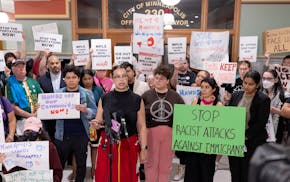WASHINGTON ‐ Rural Minnesota county officials are still trying to figure out why they were placed on a federal "sanctuary jurisdictions" list that has since been deleted.
At the Wright County Board meeting Tuesday, commission Chair Darek Vetsch said the Department of Homeland Security (DHS) posted some misinformation and thanked the office of Rep. Tom Emmer, the House Republican whip, for intervening and "getting this post removed."
"It was leading to a lot of angst and misinformation being spread out there," Vetsch said.
The Homeland Security list included 20 mostly rural counties, plus the cities of Minneapolis and St. Paul and the state of Minnesota. Several county officials said they had no idea why they were placed on the list, thought they were complying with the law and worried about the implications.
The Department of Homeland Security over the weekend took down the list, which it had announced with a message that threatened to withhold grant funds and possibly take legal action against the government entities named.
This week, officials said they still do not have an explanation.
"We don't know what we did to get on the list," said Stearns County Sheriff Steve Soyka at the Tuesday board meeting in St. Cloud. "There's no set criteria or anything that we could even look at to try to correct anything."
Wright County Commissioner Kirby Moynagh said in an email after the meeting that he opted not to file a resolution over the matter after DHS deleted the list.
However, "my constituents and I would like to know how and why Wright County was put on this list," Moynagh said.
The "sanctuary jurisdiction" list from DHS was a response to an executive order signed in April by President Donald Trump, calling on federal agencies to help expedite mass deportations of undocumented immigrants in the U.S.
Officials in several counties declined to comment. The list included Nobles and Lyon counties, where pork and turkey packinghouses rely heavily on immigrant labor. It also included Lincoln and Otter Tail counties.
"We are currently seeking clarification from DHS regarding the basis for our inclusion on the list and the process for correcting any inaccurate designation," said a statement from Otter Tail County Sheriff Barry Fitzgibbons.
On Saturday, the National Sheriffs' Association (NSA) issued a scathing statement saying the DHS list could strain relationships between law enforcement and the White House.
"Sheriffs nationwide have no way to know what they must do or not do to avoid this arbitrary label," said Kieran Donahue, NSA president and sheriff of Canyon County, Idaho. "This decision by DHS could create a vacuum of trust that may take years to overcome."
The DHS in a statement reiterated what it had said last week when questions first surfaced about how it put together the list.
"The list is being constantly reviewed and can be changed at any time and will be updated regularly," the statement said.

Minneapolis City Council lowers street food cart license fee, hoping fruit sellers will hawk legally

How the federal raid unified the fractious Minneapolis City Council against Trump, sort of
Trump travel ban 'cruel,' Minnesota advocacy group says

No verdict after first day of jury deliberation in Derrick Thompson murder trial for crash that killed 5
